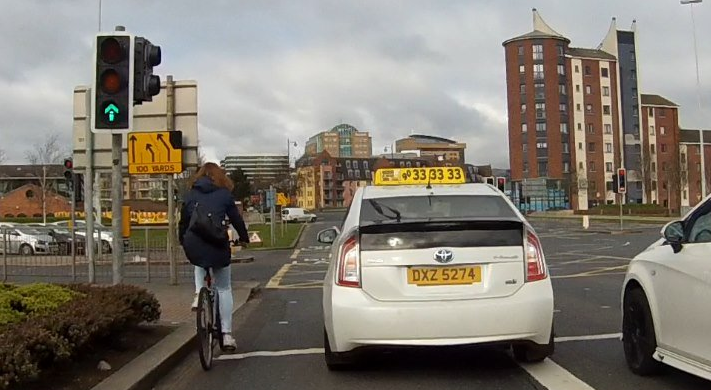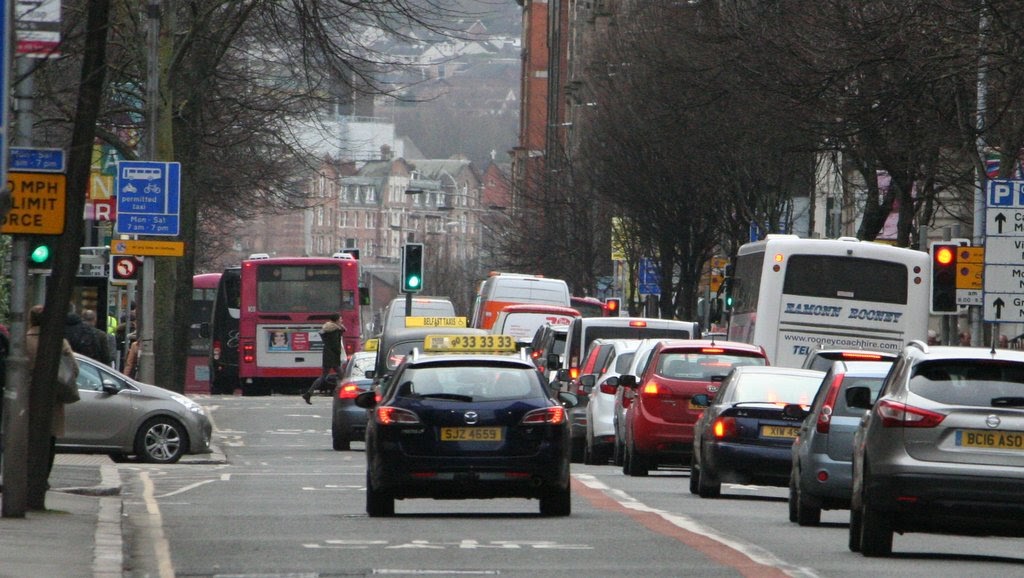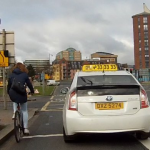Bikefast have called on the Department for infrastructure to take the long view on sustainable transport and protect our vital infrastructure from knee-jerk, un-evidenced decisions to hobble Belfast’s transit systems solely to benefit private taxi firms.
Earlier this year a group of Belfast’s biggest private taxi firms somehow secured the opening of some Belfast’s bus lanes to their vehicles, a “remarkable” lobbying effort which threatened to “sabotage the Belfast Rapid Transit system” a year before it launched, and threatened to kill off cycling levels.
Between 4,000 and 5,000 of their vehicles. (In truth not even DfI knows this figure, which is a huge issue in itself.)
At a stroke this made taxis the majority users of these sustainable transport lanes. Everyone else got four days’ notice; no chance to consult or object; no oversight from the (dissolved) Northern Ireland Assembly.

The plan had been to roll this out as a trial for six months, likely to drift into a permanent arrangement as the controversy died down. At the 11th hour Bikefast and Sustrans convinced Minister Hazzard to cut that trial down to 12 weeks. Good to their word, the Department ended the trial in mid-May and Belfast’s bus passengers and thousands who cycle every day breathed easier.
Now the Department wants your views on the trial and the policy, as if it wasn’t made clear enough already with a widespread negative backlash. People aren’t daft – they know adding thousands of taxis to bus lanes is a case of “how much worse will the experience for cycling be”, “how much slower will the buses run” and “how much of a reduction in safety and journey times is acceptable to the Department”?
https://twitter.com/NewtonEmerson/status/832584365360156674
What the Department hasn’t done is launch a full consultation – this call for views isn’t even listed on their Consultations page. In 2012 a proper consultation on the same issue (with different legislation provoking it) found 86% of people disagreed with handing our bus lanes over to private taxis.
That figure still stands.
However, the big business private taxi lobby will keep chipping away at this issue until they impose their will on everyone else. So you need to make your voice heard on why public transport journey times should be paramount in Belfast transit planning and why cycling safety is so crucial to you.
The @deptinfra want views on taxis in bus lanes trial. Closing date is 16th June.
That's Ride on Belfast day of Bike Week.
Epic trolling. pic.twitter.com/WMq5CMF3GJ
— NI Greenways (@nigreenways) May 4, 2017
And the Department need to closely examine the process of this rapidly (and quietly) developing policy. The next Minister can decide whatever they want and civil servants will have to follow – that’s a Minister’s prerogative. But the Department has a responsibility to ensure that public funds are managed with propriety and duly safeguarded.
To that, the £90m of public money poured into making Belfast Rapid Transit (BRT) a success is clearly at stake. On the most basic level, can the Department honestly stand over a trial designed to measure the impact of this policy on BRT, which was conducted without BRT operating?
Opening Belfast Rapid Transit bus lanes to taxis will undermine £90 million public… https://t.co/Udo1n4dPuC pic.twitter.com/RMZuIAwVSS
— Unite the Union NI (@UniteunionNI) May 11, 2017
Can the Department stand confidently over this policy without the benefit of full party political donation transparency in Northern Ireland?
Is the Department prepared to swallow the insulting tone of the private taxi lobby – that taxis in bus lanes somehow lanced the boil of congestion, that private taxis are the “fourth emergency service”, and that “hundreds of jobs” are at stake when big taxi firms have in fact been expanding their business in the last few years?
Private taxi rep told Cttee that without access to bus lanes "100s of jobs" would go. Despite boasts of bullish growth outside bus lanes.. pic.twitter.com/BBFKbsihBM
— NI Greenways (@nigreenways) May 11, 2017
Are the Department (or the public for that matter) happy to be treated like fools?
It was the third emergency service (live on radio) until he realised he'd completely lost the audience, the argument, the plot..
— NI Greenways (@nigreenways) May 16, 2017
Is the Department confident to stand over data from a trial which clearly wasn’t fully designed ahead of time and wasn’t fit for purpose?
Questions went unanswered until a week into the trial, and even then in face-to-face meetings it was clear that the trial had been dumped in the lap of officials with so short notice as to render the whole exercise almost useless – no baseline data shared, no information on the scale of monitoring, no measurement criteria or success/failure bounds, and (truly shocking) some random monitoring of social media for incidents and attitudes included to boot.
The trial was a shambles because of the political direction – fair play to the Department’s honest hard work to make a good fist of it, but the whole thing should be discarded.

The only reasonable way forward, whatever your view on the policy, is to address the massive research deficit exposed by the botched attempt of a narrow interest group to pull the rug out from under sustainable transport.
This will need to stretch beyond the introduction of BRT next year to allow for that service to establish and thrive. This policy direction also signals an urgent need to begin the construction of the Belfast Bicycle Network Plan so that cycling can be taken out of arguments about bus lanes.
The research which needs to be conducted includes:
- How many taxis of all categories actually operate in Belfast (including Uber) and how has this number changed annually since the introduction of bus lanes?
- How many taxis use diesel fuel?
- What verifiable impact on private taxi employment have bus lanes had since they were introduced (distinct from other economic factors)?
- What verifiable impact will bus lanes have on private taxi employment in the future (distinct from other economic factors)?
- Will prioritising private hire motor vehicles actually improve air quality in Belfast?
- How will this potential policy change affect levels of investment in wheelchair accessible taxis and taxibus services, and linked employment?
- Will shifting an unknown number of private hire vehicles into bus lanes reduce the number of vehicles in general traffic lanes or lead to an overall net gain through induced demand?
- A wide survey of health care users to determine the modal access to service points – i.e. what percentage of people every day travel by public transport, private car, different classes of taxis, walking and cycling?
- A survey of bus passenger attitudes (and Bus Rapid Transit attitudes, once launched and bedded in) to bus lane access to determine their informed view on the journey speed and reliability issues.
- What impact will this change have on fragile cycling levels while the Belfast Bicycle Network remains unconstructed?
- An evaluation of safety perception and outcomes for the vulnerable users of bus lanes, those on bicycles and motorcycles.
- What is the economic case for allowing one private service industry (taxis) free utilisation of a public utility (bus lanes) over other critical private service industries (logistics, deliveries)?
- Survey of people who cycle and monitor journeys in bus lanes.
- Carry out a general safety audit for the mix of vehicles in bus lanes.
Freeze the current bus lane access arrangement for the next five years (Buses, Class B and D taxis only, bicycles, motorcycles), let BRT bed in, build the initial cycling network and then carry out proper real-world studies.
Make public investment in sustainable transport your priority, don’t just hand the keys over to private interests.
Anything short of proper, independently researched evidence being used to direct policy, anything short of a full public consultation, anything short of rigorous fact checking of wild lobbying claims, anything short of fully evaluating the impact of this change within the context of Belfast congestion and the long-term future of city transport, and we’re left to conclude that those with “remarkable political clout“, beyond the current reach of scrutiny, can alter public policy to suit their interests over the greater good.
And shame on all of us if we let that overrule evidence-based policy making.

There is a fine balance in bus lanes right now which is continuing to support the growth of cycling and promises to support a fantastic new Rapid Transit system. People are responding to former Minister Chris Hazzard’s call for us to concentrate on moving people, not cars.
"Moving people in and out of Belfast is good for business; moving cars is not." @ChrisHazzardSF has our attention 🙂 https://t.co/0iQTioh7Ni
— NI Greenways (@nigreenways) November 29, 2016
Don’t put that at risk for the sake of narrow commercial interests. When it comes to the volume of vehicles in our bus lanes, enough is enough.
What can you do?
Bikefast has partnered with Cycling UK and Sustrans to respond to the DfI trial – read our joint response here.
Read the Sustrans blog post on the case for no more taxis in Belfast’s bus lanes.
Send your views directly to the Department for Infrastructure here.
The deadline is 16th June 2017.
You can also use Cycling UK’s form to easily respond to DfI’s call for views here.
More reading
05 May 2017 – Belfast bus lane taxi trial ends (but attack on sustainable transport limps on)
20 Mar 2017 – Bus lane taxis “impede other road users, increase journey times” says.. Infrastructure Department
04 Apr 2017 – Push to keep taxis in Belfast bus lanes backfires (Irishcycle.com)
03 Apr 2017 – Belfast taxi postcard campaign in tatters
27 Feb 2017 – DfI: Taxis in bus lanes trial will not default into a permanent arrangement
19 Feb 2017 – Survival guide to 84 days of taxis in Belfast bus lanes
18 Feb 2017 – Department declines to answer questions ahead of taxis in bus lanes “trial”
08 Oct 2014 – Reform and revolution | Taxis in bus lanes
06 Oct 2014 – Rapid transit? | Taxis in bus lanes
01 Oct 2014 – Wall of steel | Taxis in bus lanes
26 Sep 2014 – 4,000+ taxis in Belfast | Taxis in bus lanes
23 Sep 2014 – Perspective | Taxis in bus lanes
22 Sep 2014 – Fightback | Taxis in bus lanes
21 Mar 2013 – What value in the perception of cycling safety?
21 Feb 2013 – All Taxis in Bus Lanes – Why I Am Opposed (niroads.com)
07 Feb 2013 – DRD determined to halt Belfast cycling progress?
18 Sep 2012 – NI Greenways response to taxis in bus lanes consultation
05 Sep 2012 – Taxis in bus lanes a backward step for cycling




[…] A £90m investment in Belfast Rapid Transit will see a genuine alternative to private motoring debut in the city by September 2018, as long as sense prevails through the maddening stupidity of the taxis in bus lanes issue. […]